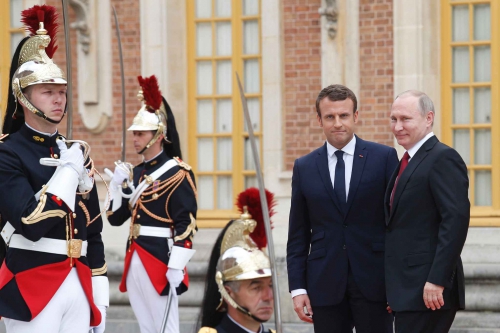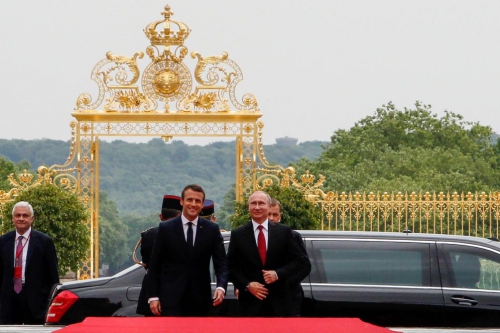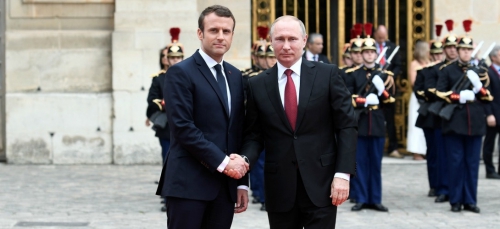The Kremlin has published the complete text of the brief but highly illuminating press conference which followed the Macron-Putin summit in Versailles.
I have previously expressed bafflement as to why Macron invited Putin to a summit meeting at all given that the extraordinarily hard line against Russia which he seems intent on following. The text of the press conference provides the answer, and it shows how delusional and arrogant Europe’s leaders including Macron have become.
It turns out that Macron’s purpose was nothing less than the grandiose one of “educating” Putin on why Russia needs to align itself with Europe in order to ‘modernise’, which means reversing the domestic and foreign policy line it has been following since the crisis of 1998 of pursuing building its own ‘sovereign democracy’ and of aligning with China.
Macron sought to do this by conjuring up the supposed example of Russia’s Westernising tsar, Peter the Great.
That was why Macron invited Putin to a summit in Versailles, which is hosting an expedition commemorating Peter the Great’s visit to France in 1717, and why he opened his news conference with this extraordinary passage
First of all, I would like to thank President Putin for accepting the invitation which I extended to him during our telephone conversation some time after I took office. I invited him to come to this symbolic place, where today we celebrate the 300thanniversary, almost to the day, of Peter the Great’s visit to France. The Russian tsar arrived in France to better understand the secrets of the kingdom, which stunned the world.
During the visit, which lasted several weeks, Peter the Great spent several days at Versailles, which already then represented the pinnacle of arts and technology, and where the ideals professed by Enlightenment figures and the genius of the spirit of that era were already beginning to emerge in the early 18th century. It was in Versailles that Peter the Great met with engineers, writers, and archivists. As we know from history, he returned to Russia some time later with new ideas and beliefs, as well as sketches (which we will see together in a short while), with a great desire to modernise your country. He was elected Honorary Member of the Royal Academy of Sciences, which was a source of inspiration for him.
Peter the Great is a symbol of the Russia that wanted to become open to Europe and borrow from Europe the things that made it great and strong. We have just talked about this during our discussion. What is particularly important about this story, which is now three centuries old, is the dialogue between Russia and France that never stopped, the dialogue between our intellectuals and our cultures, which sowed the seeds of the friendship that has lasted to this day. This dialogue is marked by our outstanding thinkers, artists and statesmen.
You will see a sketch of the monument to Peter the Great, with which you are familiar, Mr President, since you were born in that beautiful city which is dear to you. This is the statue that became the pride of St Petersburg, your beloved city.
This Russia that is open to Europe, and this Franco-Russian friendship is what I wanted to share with you by inviting you here, to Versailles. This was the basis of our discussion today. This history transcends us and has cemented Franco-Russian friendship.
During the presidential election, France made a sovereign affirmation of its commitment to independence, its European choice and its desire to influence the fate of the world. None of the major challenges these days can be tackled without a dialogue with Russia.
This is exactly why I wanted to discuss together
(bold italics added)

Any other leader would have let his anger at these condescending words show. Putin instead – showing off his knowledge of Russian history, which is certainly greater than Macron’s – effortlessly brushed them off
I would also like to thank President Macron for inviting me to come to this wonderful corner of France, to Versailles, which I have never visited before. It is definitely an impressive place that speaks of France’s grandeur and its long history, which plays a substantial part in the ties our two countries share. This is reflected in the exhibition we are about to visit, an exhibition marking the 300th anniversary of the visit to France by tsar and reformer Peter I. The ties between Russia and France did not begin with this visit however, but go back much deeper in time.
The educated French public is familiar with Anna of Rus, Queen of France. She was the youngest daughter of Yaroslav the Wise, married Henri I and made a substantial contribution to France’s development as one of the founders of at least two European dynasties, the Bourbons and the Valois. One of these dynasties is on the throne to this day in Spain…..
The exhibition we will visit now presents priceless items from the State Hermitage Museum related to Peter the Great’s visit to France in 1717. As President Macron and I noted, this visit has become a major milestone in the history of our bilateral relations, setting them on a friendly track for many years to come…..
I would like to thank the President once again for his invitation. He mentioned that Peter the Great spent several weeks in France, but as we know, everything in the diplomatic world is built on the basis of reciprocity. I would also like to invite the President to visit Russia. I hope he will be able to spend several weeks in Moscow.
(bold italics added)
In other words the starting point of Russian history – and of Russia’s interactions with Europe – is not the reign of Peter the Great, and Russia does not simply learn from the West – as an inferior civilisation learns from a superior one – but has had an equal and mutually beneficial millennially long interaction with it, whilst successful bilateral relations today depend not on some sort of ‘teacher-pupil’ relationship, but depend on reciprocity: on taking into account the other side’s interests.
Putin made the same point rather more sharply in an interview he gave to the French newspaper Le Figaro.
It is true that President Macron invited me to take part in the opening of the exhibition. However, let me tell you straight away that the relations between Russia and France have a much longer history and much deeper roots, as the French President and I both mentioned on several occasions today. In fact, the younger daughter of Yaroslav the Wise, one of Russia’s Grand Princesses, Anna came here in the 11th century to marry King Henry I of France.
She was actually called Anna of Rus, Queen of France. Her son Philip I of France was the founder of two European royal houses, the Valois and the Bourbons, and the latter rules in Spain to this day.
This goes to say that the roots of our relations go much deeper, although over the last 300 years they did pick up momentum. This is true. I very much hope that today’s event, the exhibition and my talks with President Macron will give a new impetus to these relations……
As I have said to my French colleague and our French friends today, Peter the Great was above all a reformer, a man who not only implemented the best and the most up-to-date practices, but also was undoubtedly a patriot, who fought to secure for Russia the place it deserved in international affairs.
But above all, he was committed to reforming his country, making it modern, resilient and forward-looking. He succeeded in many, if not all of his undertakings. He focused on research, education, culture, military affairs and statehood, leaving an immense legacy that Russia has been relying on to this day, let alone the fact that he founded my hometown, St Petersburg, which was the capital of Russia for many years.
(bold italics added)

In other words, not only did Russian history and Russia’s interactions with Europe not begin with Peter the Great, but Peter the Great was like Putin first and foremost a Russian patriot all of whose actions were focused on making Russia strong so that it could better defend its national interests.
As well as putting Macron firmly in place about Peter the Great and Russian history, Putin during the press conference in his usual mischievous way gently ridiculed the suggestion that France is in any position to impose its own unilateral ‘red lines’ in Syria, as Macron purported to do
France of course is making its contribution to the fight against terrorism in Syria as part of the US-led international coalition. We do not know how much independence France has when it comes to operational matters because these are agreements between allies and we are not privy to that.
(bold italics added)
There has recently been some heart searching in Europe that by sticking to its tough policy Europe risks “losing” Russia. Angela Merkel’s recent visit to Russia was it seems intended in part to calm these concerns. Macron’s invitation to Putin also appears to have been motivated by these same concerns. This is how the Financial Times reported them and explained the purpose behind Macron’s invitation to Putin
Mr Macron is now keen to reset the relationship with Moscow aides say. “There have been missed opportunities with Russia in the recent past, on Syria notably. The idea is to keep Russia close to Europe,” an adviser to Mr Macron said before the meeting.
The problem is that though Macron seems to realise the importance of restoring relations with Russia, he brings with him no new ideas of how to do it. Conjuring up the misunderstood ghost of Peter the Great whilst refusing to address Russia’s concerns and whilst giving Russia stern lectures about Ukraine, Syria and the rights of gays in Chechnya, is certainly not the way.
The trouble is that despite the hammering that what is sometimes called the “European idea” has recently suffered because of Brexit, the election of Donald Trump, and the electoral gains in France of Marine Le Pen, the European political establishment remains in denial about the diminishing attractiveness of “Europe” be it to Russia, Turkey or anyone else. The result is that they continue to overplay their hand, as Macron has just done with Putin.
Take this extraordinary comment of Michel Duclos, director of Académie Diplomatique Internationale and a former diplomat at the French embassy in Moscow, as reported by the Financial Times
Putin thought he would have an ally in Washington, which has proved not to be the case. At the beginning of the year he thought he would have a friend in the Elysée, and this has not been the case either. Now everybody is talking about China. He desperately needs to patch things up with Europe, and he has an opportunity with Macron.
(bold italics added)
This is utterly delusional, fantasising that Russia sees China as a threat rather than an ally and is therefore obliged “to patch things up with Europe” on Europe’s (ie. Merkel’s and Macron’s) terms. Coming shortly after the One Belt, One Road conference in Beijing, and shortly before Chinese President Xi Jinping’s visit to Russia, such a comment is beyond bizarre, and shows how parochial thinking in Europe has become.
As for Putin, whilst his meeting with Macron can hardly have satisfied him, it did at least provide him with an opportunity to see to some unfinished business.
At the peak last autumn of the West’s public relations campaign against Russia for its alleged bombing of Aleppo Putin cancelled a visit he was due to make to Paris to attend the opening of a Russian cultural centre. Macron’s invitation now enabled Putin to visit the centre.
Putin is said to have cancelled his visit to France in the autumn because he expected a boorish reception from the French, with President Hollande refusing to meet with him. He has now visited the centre whilst in France as an honoured guest, have been received in Versailles by President Macron.
Putin must have savoured the moment, all the more so as the reversal shows where the real power in the world now lies.





 del.icio.us
del.icio.us
 Digg
Digg
Les commentaires sont fermés.